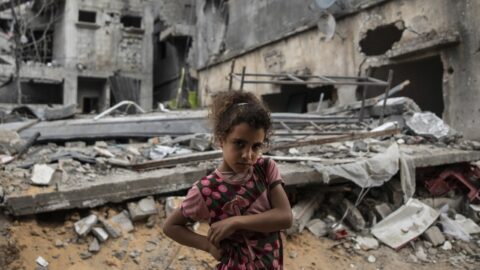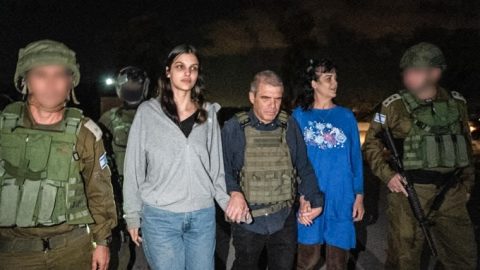Iraqi foreign ministry summons U.S Charge d’Affairs
The Iraqi foreign ministry summoned the U.S. Chargé d’Affaires of the United States Embassy in Baghdad to lodge an official complaint about the overnight air strikes in Iraq and Syria.
The summoning order was to “deliver an official note of protest regarding the American attack that targeted military and civilian sites in the Akashat and Al-Qaim regions yesterday evening,” the ministry told the Iraqi News Agency.
U.S. continues to repel ongoing Houthi strikes in the Red Sea
The U.S. sent nearly a dozen F/A-18 fighter jets to repel multiple incoming drones fired by Houthi rebels in Yemen last night, U.S. officials told NBC News.
Fighter jets were supported by EA-18 Growlers protecting the jets from Houthi defenses, they added. The attacks were not part of larger retaliatory actions on Iraq, Syria and Yemen, U.S. defense officials said.
A Houthi spokesperson said yesterday that the group “will not hesitate to carry out further military operations against the Zionist enemy” despite retaliation in the Red Sea from U.S. coalition forces. Houthis had earlier carried out a missile operation in Israel’s south “with a number of ballistic missiles,” the statement added.
Separately, Ambrey, a maritime risk assessment company, said there had been two explosions off Zubair Island in the Red Sea, off the coast of Yemen.
EU foreign policy chief calls for de-escalation in the Middle East
All parties engaged in the widening conflict in the Middle East should work to prevent a more dangerous conflict, E.U. foreign policy chief Josep Borrell said today.
“Everybody should try to avoid that the situation becomes explosive,” Borrell said at a meeting of E.U. foreign ministers in Brussels, adding that the Middle East was a “boiler that can explode.”
He did not name the U.S. directly, but said that all parties should “try and avoid an escalation.”
‘We will continue to take action,’ says U.S Central Command
The U.S. will continue to take action against Iran’s Islamic Revolutionary Guard Corps and affiliated groups, a U.S. Central Command (CentCom) Commander said, the morning after U.S forces struck more than 80 targets in Iraq and Syria.
The U.S. will “do whatever is necessary to protect our people, and hold those responsible who threaten their safety” said General Michael Erik Kurilla.
Civilians killed in U.S attacks on Iraq, government says
Overnight airstrikes on Iraq killed 16 people, including civilians, and wounded 25 others, a spokesperson for the Iraqi government said in a statement.
The strikes, on Akashat and Al-Qaim, near Iraq’s western border with Syria, also caused “losses and damage to residential buildings and citizens’ property” the spokesperson added.
The attacks “put security in Iraq and the region on the brink of abyss” the statement added, saying that Iraq was “not the appropriate place to send messages and show force between opponents.”
U.S. airstrikes fueling Middle East conflict in ‘a very dangerous way,’ Syria says
Overnight air strikes on Iraq and Syria are fueling the Middle East conflict in “a very dangerous way,” the Syrian foreign ministry said in a social media statement today.
Accusing the U.S. of inflaming the conflict, the foreign ministry said on Facebook that the strikes were violations of Syria’s “sovereignty, territorial integrity, and the safety of its people.”
In a separate statement also shared to Facebook, Syria’s defense ministry said that the strikes had caused “significant damage to public and private property.”
General Command of the Syrian army warned that, “The occupation of parts of Syrian lands by American forces cannot continue.”
Hamas holds ‘consultations’ on hostage deal but reiterate calls for full cease-fire
TEL AVIV — The head of Hamas’s political bureau said yesterday that the militant group has held “consultations” on a proposal to free Israeli hostages held in the Gaza Strip, but reiterated its demands for a complete and final halt to Israel’s attacks on the Palestinian coastal enclave.
Hamas’s list of demands, nearly all of which have been publicly rejected by Israel, belie recent signals by diplomats who have participated in the negotiations and Hamas itself that the militant group may be willing to compromise.
“The study of the new proposal for a cease-fire is based on the basis that any negotiations lead to a complete end to the aggression,” said the statement from Ismail Haniyeh, which was released on Hamas’s official Telegram channel on Friday evening.
The statement added that negotiations should lead to “the withdrawal of the occupation army outside the Gaza Strip, the lifting of the siege, reconstruction, and entry of all life requirements for our people, and the completion of an integrated exchange deal.”
Haniyeh’s statement echoed comments from Osama Hamdan, a senior Hamas official in Beirut, who told Lebanese media on Friday that the “complete withdrawal from Gaza and release of prisoners are two main conditions for accepting the deal.”
Hopes had grown that the deal might be nearing agreement over the coming days. On Thursday night, a spokesman for the foreign ministry of Qatar, one of the main interlocutors in the hostage negotiations, said the “proposal has been approved by the Israeli side and now we have initial positive confirmation from the Hamas’s side also on the framework.”
It was unclear on Friday whether the twin statements would force a return to painstaking negotiations to free 136 hostages still held in the Gaza, including six Americans.
Leaders from four nations had arrived at the proposal during meetings in Paris over the weekend.
The Paris deal reportedly would have swapped one Israeli hostage for the release of three Palestinians currently held in Israeli prisons.
The exchange would take place in stages for as long as six weeks, during which Israel would be expected to halt their months-long incursion in the Gaza Strip.
But officials in Israel’s government have repeatedly tamped down speculation that Israel may also be nearing approval of the deal.
The terms of the exchange still haven’t been handed over from the War Cabinet to Israel’s full cabinet, according to an Israeli government official — a necessary first step toward final approval.
If approved by the full cabinet, the Israeli public would then have 24 hours to contest it before the Supreme Court, though in the past the court has typically rejected such challenges.
Israel’s Prime Minister Benjamin Netanyahu has stated repeatedly this week that he will not accede to a deal that would see the “release of thousands of terrorists” nor withdraw Israel’s army from the Gaza Strip, where Netanyahu has vowed to eradicate Hamas.
Video appears to show the fire and secondary effects from a U.S. airstrike in Iraq.
An Iraqi security official told NBC News that a strike targeted a weapons warehouse and three houses belonging to Kata’ib Hezbollah in Anbar Province, which is in western Iraq.
Analysis: Strikes underscore Iran’s presence in the region
ERBIL, Iraq — Initial reports from the region suggest that the focus of tonight’s U.S. attacks have been Anbar province in Iraq and Deir ez-Zor governorate in Syria. The strikes ran along the same border that connects to Jordan and Tower 22, where three American service members were killed. They also hit areas home to the Iranian-backed militia accused of carrying out last Sunday’s deadly attack.
“This is by far the most expansive military action we’ve seen against Iran’s proxies in Syria and Iraq to date,” said Charles Lister, senior fellow at the Middle East Institute. “That makes it a significant development.”
The scale and scope of tonight’s strikes also underscore how embedded Iran has become in this region. There are many more places with ties to Iran that the U.S. could have hit but has chosen not to in this first stage. They include known Iranian facilities around Damascus and Aleppo airports, sites targeted by the Israelis last year.
While this is a substantial strike by the U.S., an escalation, it is so far also limited. The question is whether it is enough to change Iran’s long term strategy of pressuring Israel and pushing America out of the region.
“In terms of measuring how maximalist or minimalist we could have been, this sits somewhere in the middle, Lister said. “I’d count on the militias feeling relatively confident that they’ll be targeting Americans again not too long from now.”
U.S. conducted strikes knowing there would likely be casualties
When the United States struck Iranian-backed militia targets in Iraq and Syria today, they did so knowing that there would likely be casualties, officials said.
Militants and Iran’s Revolutionary Guard Corps use the facilities that were struck in retaliation for a drone attack that killed three U.S. service members, Lt. Gen. Douglas A. Sims II said.
He said that the U.S. feels good about the precision of the strikes and that they were strong military targets.
The military made the strikes understanding there would likely be casualties, Sims said. A number of casualties was not immediately clear from officials.













Recent Comments